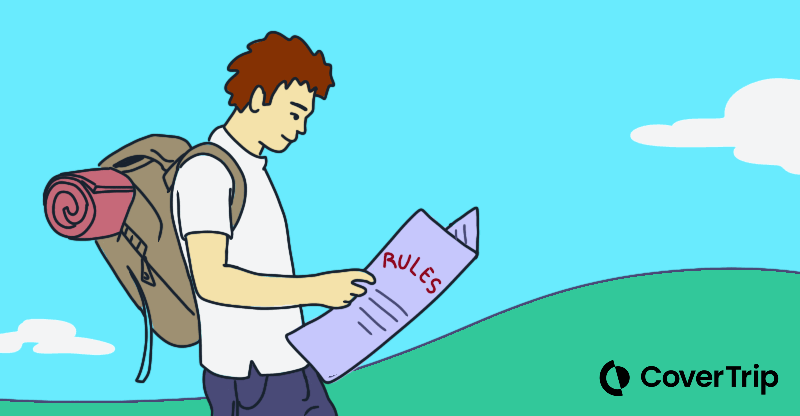8 Unbreakable rules for tourists
15 March 2023
We’re not talking about the unwritten rules of politeness, like asking permission before taking photographs of people and learning common phrases in the local language. No siree.
We’re talking about travel rules that may seem odd, but each can land you in jail or cause a hefty fine. Seriously, these are travel rules you absolutely do not want to break.
See the following list of unbreakable travel rules.

1. Wear the right shoes
Wearing the right shoes can make or break a long day of travel. No traveler should count on being comfortable in brand-new shoes that haven’t been broken in. After a long day of climbing duomos in Italy, blisters are likely. Ask me how I know 😉
It’s not just about comfort and your ability to keep up with the group. Some types of shoes are actually illegal. For example, sharp-heeled shoes are banned from ancient sites in Greece, like the Parthenon and the Acropolis, to prevent scratches. Tourists walking the vineyards or hills between the villages of Cinque Terre are subject to a fine if caught wearing flimsy footwear like sandals, flip-flops, or heels.
In some places, you’ll want to avoid traveling with expensive shoes. For example, outside the Buddhist temples, pagodas, and holy places in Asia, you’ll see rows of shoes waiting for their owners to return. If your shoes are identifiably expensive, they may not be there when you return.
Pro tip: flip flops and slide sandals are OK in Europe, but only at the beach or the pool.
2. Take breaks on proper benches only
When you’ve been walking for hours, and you need a break, look around and find a proper bench or seat before plopping your butt down. The police in some countries can fine you for sitting on bridges, steps, or historic monuments.
3. Swim only where it’s allowed
You can fill your water bottle at any of Rome’s 2,500 public drinking fountains, but you can’t cool your feet in the fountains. Weird, right?
There are plenty of swimming bans in the world, and not all of them are marked by signs.
If you’re hot and want to cool off, ask a local where you can and can’t dip your toes before you get into trouble.
Bonus: it’s not always permitted to walk about shirtless or wearing only a bikini, either. Be mindful of the nuanced rules on nudity to avoid being jailed or fined.
4. Know where you can eat and drink
All that walking can make a traveler hungry! Still, think twice before eating or drinking. Eating and drinking are prohibited near many tourist attractions in Rome and most historical sites in Greece.
Pro tip: leave gum at home if you’re heading to Singapore – it’s banned entirely and illegal to import it.
5. Avoid feeding any wildlife
Yes, the pigeons and squirrels are cute, and they’re gifted little beggars. Breaking off crumbs to share with them not only disrupts their digestive systems, but it can also earn you a nasty fine.
A few examples:
- Feeding the pigeons in Venice and Singapore will cost you a hefty fine.
- It’s illegal to feed deer or squirrels in most areas of California.
- It’s an offense in Western Australia to feed animals and birds.
- It’s illegal to feed feral chickens in Hawaii.
If you want to feed and watch animals, head to the zoo instead.
6. Keep acts of affection private
Couples traveling inside the United Arab Emirates should keep acts of affection out of the public eye. UAE laws prohibit kissing, touching, or even holding hands in public. Public acts of affection can actually land you in jail like this couple.
7. Take only purchased souvenirs
Much like the rules around not disturbing natural landscapes at the US National Parks, it’s illegal in many countries to take things like rocks, sand, seashells, plants, etc. The last thing you want to do is be jailed trying to bring home a bag of sand from your favorite beach on vacation.
8. Wear a helmet
It’s not uncommon for a person to offer you a helmet if you’re riding a bicycle in Australia or New Zealand without one. It’s illegal for cyclists to ride without a helmet, and the rule is enforceable by police and bystanders.
If someone hands you a helmet in New Zealand – put it on!
Related topics
Damian Tysdal is the founder of CoverTrip, and is a licensed agent for travel insurance (MA 1883287). He believes travel insurance should be easier to understand, and started the first travel insurance blog in 2006.
